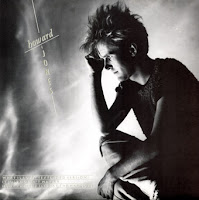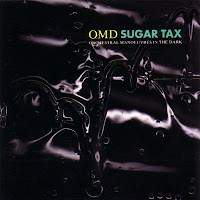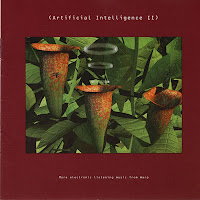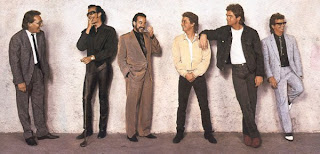 |
| The Secret Of My Success poster |
There
were essentially three reasons for choosing that film. The first was
that it starred Michael J. Fox. The second was that it was set in New
York, and I probably spent as much time as I did on the film's flimsy
premise as I did trying to identify the skyscrapers in the vicinity
of the Pemrose Corporation's Midtown offices. The third reason for
choosing this above any other DVD from the box was simply because
it's an Eighties film, and for some reason, probably because I grew
up in the Eighties, I'll naturally gravitate to films from that era
if I'm feeling aware of the passage of time; it could easily have
been Back To The Future, The Breakfast Club or Ghostbusters. They're
all in the box, but for that evening it was The Secret Of My Success
that won the day.
Everything
about The Secret Of My Success screams Eighties, and by that I don't
just mean the suits and haircuts. There's a plot line involving a
huge dose of corporate greed and unbridled ambition (think Wall
Street without the insider trading and with madcap antics), an
obligatory and arguably unnecessary romantic interest, the bad guy
and the improbable triumph of Fox over said bad guy in the hastily
concluded, feel-good final moments. The other Eighties quality was
the soundtrack, lead by Night Ranger's gutsy, upbeat and overblown
title track (I actually really like it for precisely those reasons;
sadly it's not available from iTunes). Here's the video.
It
occurred to me that Eighties soundtracks do generally have a
distinctive quality that time-stamps them every bit as well as the
fashions and story lines - the other options all have big, memorable
songs on their soundtracks, for example. By coincidence, earlier this
week I completed an interview with Rupert Lally who, in addition to
his solo releases or work in collaboration with Espen J. Jörgensen
and others, enjoys a parallel career as a composer for film, TV and a
Swiss dance company. So, as an unplanned extension of that interview
I decided to ask him about what made Eighties soundtracks so
distinctive.
'Eighties
film soundtracks were revolutionary for two main reasons,' Lally
advises. 'The first was their use of songs, and the second was their
use of synthesizers.'
'There
were examples of movies using songs before the Eighties of course.
That started with the Elvis and Beatles movies, but these were closer
to the tradition of film musicals. The idea of constructing a
soundtrack for a non-musical movie using primarily songs began in the
Seventies with soundtracks such as The Graduate and Midnight Cowboy.
Both of these are templates for the sort of soundtrack that would
rise to prominence in the Eighties because they are a mixture of
score and songs with, in the case of Midnight Cowboy, the composer
John Barry co-writing some of the songs. This is a very important
ingredient to the success of those Eighties song scores, in that most
of the time people like Giorgio Moroder, Harold Faltermeyer or Keith
Forsey (who scored The Breakfast Club) would not only write the score
but also write or co-write the songs.' Indeed, Forsey was one of the
two songwriters for 'Don't You Forget About Me' by Simple Minds, the
unforgettable title track for The Breakfast Club, while David Foster,
who provided the soundtrack to The Secret Of My Success, co-wrote the
Night Ranger track above.
'In
retrospect this was the beginning of a very slippery slope with
studios using soundtracks to help sell a movie,' rues Lally.
'Eventually, the harmonious relationship between songs and score
began to disappear as the time frames to produce a score became
shorter, and at the same time the score composers' participation with
the songs became nonexistent.' That breakdown would lead to the type
of soundtracks offered today which are more like pastiches of Now!
compilation albums with a few exclusives thrown in if the studio can
be bothered.
Turning
to the use of new technology, Lally is more enthusiastic. 'Synths had
been used to score films well before the Eighties too, with scores to
films like The Forbidden Planet being one of the earliest examples.
But the idea of a totally electronic score being accepted as standard
practice for a mainstream film didn't develop until the Eighties for
two main reasons. First, synthesizers became cheaper and therefore
available to the average musician. Second, the invention of home
video resulted in such a massive demand for product that low-budget
or independent companies, who didn't have the budget for an
orchestral score, would happily hire a guy or gal with a few synths
to create the soundtrack. This studios were able to thrive in a way
that they hadn't since the drive-in movie theatres started to go out
of business.'
So
if you ever wondered what makes Eighties soundtracks so memorable,
that's why.
Rupert
Lally on Eighties film soundtracks
At
the end of my interview with Lally he described his favourite
electronic music records. Here he does the same for Eighties movie
soundtracks.
Vangelis Blade Runner
This
is such a beautiful score on so many levels. The choice of sounds is
very orchestral - Vangelis uses very few timbres here. Then there are
those wonderful brass and pad sounds from the Yamaha CS80, a Fender
Rhodes electric piano, a heavily processed grand piano, sampled
timpani and percussion from an Emulator and a live gong; occasionally
he'll add a saxophone or Mary Hopkin's very pure sounding voice, but
otherwise that's it. It creates a feeling of an ensemble. Supposedly
he performed the score live to tape watching the film on screen
whilst he played, creating much of it on the spur of the moment;
which to me only enhances it's greatness.
Maurice
Jarre Witness
This
is another benchmark synthetic score for me. Jarre apparently used
four session synthesizer players in a little quartet and recorded
them playing all together for the this score, which is probably why,
despite being wholly synthetic, it has the feeling of chamber music
at times.
Giorgio
Moroder Cat People
A
great, pulsing score from Moroder, which, according to Paul Schrader
(the director), was achieved by Moroder recording layer after layer
of synths onto multi-track tape and then fading the different layers
in and out during the mixing process. There's a great use of the
(co-written) song 'Putting Out Fire' by David Bowie too.
Harold
Faltermeyer Beverly Hills Cop
This
choice will probably get a few groans, but forget the familiarity of
the main theme [the ubiquitous 'Axel F']and watch the movie again
paying special attention to the score. The mood that Faltermeyer (who
also wrote some of the songs) manages to create from such minimal
ingredients is very impressive. The theme is used again and again in
the film in many different ways, and in that sense the score takes a
very traditional approach to film scoring using untraditional means.
Brad
Fiedel Terminator
People
always forget that the first Terminator film was an extremely
low-budget movie. Using little more than an Emulator sampling
keyboard, a Prophet 10 synthesizer and a DMX drum machine, Fiedel
created this (still) iconic score that suggests the relentlessness of
the Terminator using repetitive rhythms and sampled clanging metal.
Wendy
Carlos Tron
Carlos
is a classically trained composer, and her scores reflect this - her
score for Tron almost borders on opera at times, which for me is a
love / hate thing. There is no doubting this scores' incredible power
however.
Arthur
B. Rubinstein Wargames
At
first listen, it's difficult to believe this score is really the work
of one person, but it is. From the militaristic Brass music of the
opening credits, to the synth pop songs underscoring the youthful
Matthew Broderick playing in the video arcade, to the beautiful solo
piano theme for Professor Falken, Rubinstein wrote them all.
Ennio
Morricone The Thing
I
had to have at least one John Carpenter score in here and even though
Carpenter didn't write this one himself, his influence is clearly
apparent. The feeling of impending doom is apparent from the first
bar of the opening theme.
James
Horner Gorky Park
Horner
has become a little bit of an in-joke in the scoring industry for his
ability to keep using the same melodies and motifs in many of his
scores. However, at the beginning of his career he was the king of
creating scores for independent movies that belied their low budget
roots. His use of a cymbalom alongside synths and a brass ensemble is
both startling and incredibly dramatic.
Hans
Zimmer Black Rain
Like
Horner, Zimmer's familiarity has led to people dismissing his work at
times, which is wrong because his early scores like this which blends
pulsing synths, orchestra and traditional Japanese instruments, were
revolutionary. He still has the ability to surprise even today - take
his score for The Dark Knight for instance - plus he began his road
to Hollywood mega score-dom as a synth programmer working in a little
studio in my home town of Brighton, and for that, if nothing else, he
has my undying respect.




















